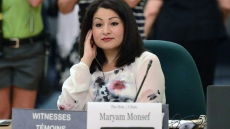VANCOUVER — A British Columbia foster mother says there are no words to describe her loss after the provincial government removed a Metis toddler she has raised almost since birth from her care.
The woman's lawyer says the Ministry of Children and Family Development moved the little girl to a local transition home on Sunday, after the foster parents lost two appeals in B.C.'s highest court.
Lawyer Jack Hittrich said the ministry plans to move the toddler to Ontario next week to live with her older sisters and adoptive parents, who she has never met.
The foster parents cannot be named in order to protect the identity of the child, who is nearly three and has been in the Vancouver Island couple's care since she was two days old.
"She was thriving. She was happy. She was loved," said the foster mother in an email. "She was growing in a community where she would know her birth parents and her culture. And now the ministry has stripped her of all of it."
The couple is refusing to give up their fight to adopt the little girl. Hittrich said they have filed leave to appeal with the Supreme Court of Canada, and have another petition before B.C. Supreme Court.
The case has raised cultural issues as the foster mother is Metis, while the adoptive parents in Ontario are not.
The foster mother said that according to Metis customs, she and her husband have already adopted the girl.
But the woman said the ministry contracted a Metis agency to hold a cultural ceremony for the toddler on Wednesday. She said the ceremony was part of the Metis adoption process and was part of the ministry’s plan to adopt the girl to the Ontario couple.
"This ceremony is a sham and is not representative of our Metis people or traditions," she said. "They can't just try to re-adopt our daughter to someone else when we have already adopted her."
She said aboriginal laws are protected under the Constitution, but the ministry has instead chosen to "ignore" the child's rights and waste taxpayer money fighting the placement of a happy Metis girl in a loving Metis home."
"We love our daughter. We fear for her. We fear that she will not understand. We fear that she wonders why we aren't coming to pick her up. She has no idea how much we want to," she said.
"We are fighting back the tears constantly and trying to stay strong for her."
Under B.C. law, the ministry is the girl's legal guardian and it has the authority to select her adoptive parents.
A ministry spokesperson said in a statement that a child's best interests supersede all other considerations when deciding where they will be placed.
"In general, the relationships children have with their siblings are the most lasting of any relationships they'll experience in their lifetimes," the statement said.
"Enabling and protecting those relationships is a key consideration in determining the child's best interests — as is the importance of preserving the child's cultural identity."
When the ministry considers placing an aboriginal child with a non-aboriginal family, a social worker must obtain approval from a committee of First Nations, Metis and child welfare representatives, the statement said.
It added that some children are allowed to remain in contact with their former foster families, if all parties agree and the contact is in the child's best interest.
The foster mother has not seen the little girl since Sunday, as she declined an invitation to the cultural ceremony on Wednesday. The ministry has invited the foster parents to visit her in Ontario once she is settled with her new adoptive family, Hittrich said.
The foster parents and the B.C. Metis Federation have filed a petition in B.C. Supreme Court arguing that the Metis family already adopted the girl according to aboriginal customs, Hittrich said.
The province has filed a motion to strike the petition, which will be heard Thursday, said Hittrich.
Two other petitions filed by the couple have already been dismissed. Last week, those decisions were upheld in a unanimous decision by a five-judge panel of the B.C. Court of Appeal.
Keith Henry, president of the B.C. Metis Federation, compared the situation to the Sixties Scoop, when thousands of aboriginal children were placed with mostly non-aboriginal families.
"What's different about this?" he asked. "We'd like to think as a society that we've come so much further ... It's backwards and we have to put a stop to it."




